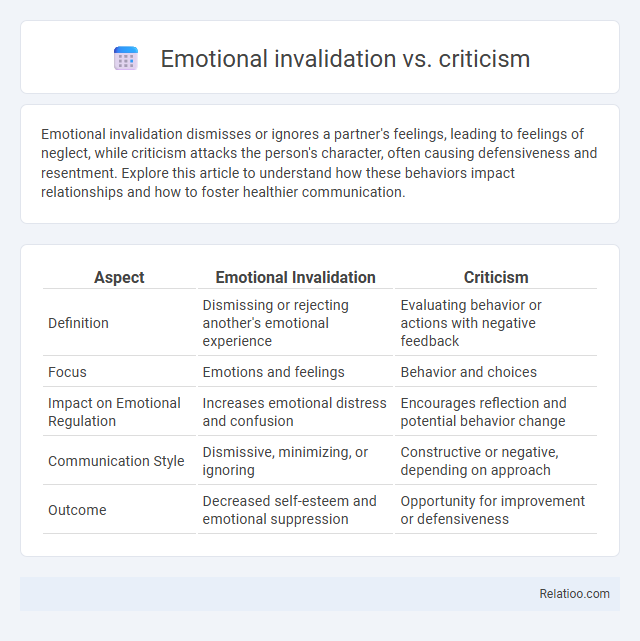Emotional invalidation dismisses or ignores a partner's feelings, leading to feelings of neglect, while criticism attacks the person's character, often causing defensiveness and resentment. Explore this article to understand how these behaviors impact relationships and how to foster healthier communication.
Table of Comparison
| Aspect | Emotional Invalidation | Criticism |
|---|---|---|
| Definition | Dismissing or rejecting another's emotional experience | Evaluating behavior or actions with negative feedback |
| Focus | Emotions and feelings | Behavior and choices |
| Impact on Emotional Regulation | Increases emotional distress and confusion | Encourages reflection and potential behavior change |
| Communication Style | Dismissive, minimizing, or ignoring | Constructive or negative, depending on approach |
| Outcome | Decreased self-esteem and emotional suppression | Opportunity for improvement or defensiveness |
Understanding Emotional Invalidation
Emotional invalidation occurs when your feelings are dismissed, ignored, or judged, undermining your emotional experience and leading to confusion or self-doubt. Unlike criticism, which focuses on evaluating behaviors or actions, emotional invalidation directly attacks the legitimacy of your emotions, making it harder to process and express them. Understanding emotional invalidation is crucial for fostering healthy emotional communication and building resilience in personal relationships.
What Is Criticism?
Criticism involves evaluating or expressing disapproval of someone's thoughts, actions, or behavior, often with the intent to improve or correct. Emotional invalidation dismisses or negates your feelings, making you feel unheard or misunderstood, while constructive criticism focuses on specific issues without attacking your worth or emotions. Understanding the difference helps you navigate feedback more effectively and maintain emotional well-being.
Core Differences Between Emotional Invalidation and Criticism
Emotional invalidation dismisses or undermines an individual's feelings, creating a sense of emotional neglect, while criticism targets behaviors or actions, often highlighting faults or mistakes. The core difference lies in emotional invalidation negating personal experience and feelings, whereas criticism addresses specific conduct without necessarily devaluing emotions. Understanding this distinction is crucial for fostering healthier communication and emotional support.
Common Examples in Everyday Life
Emotional invalidation often appears when someone's feelings are dismissed with phrases like "You're overreacting" or "It's not a big deal," undermining genuine emotional experiences. Criticism typically involves negative evaluations such as "You did that wrong" or "You're not good enough," targeting behaviors or traits rather than emotions. Emotional neglect, distinct from invalidation and criticism, occurs when emotional needs are ignored or unmet, for example, a caregiver not responding to a child's distress or avoiding emotional conversations.
Psychological Impact on Individuals
Emotional invalidation dismisses or negates Your feelings, leading to increased anxiety, low self-esteem, and difficulty trusting personal emotions. Criticism targets specific behaviors or actions, which can foster growth when constructive but may result in shame or defensiveness if harsh or constant. Both emotional invalidation and criticism can severely impact psychological well-being, with invalidation often causing deeper emotional confusion and criticism potentially triggering stress or decreased motivation.
Signs You’re Experiencing Invalidation or Criticism
Signs you're experiencing emotional invalidation include feeling dismissed, unheard, or told your emotions are wrong or exaggerated, often accompanied by phrases like "You're overreacting." Criticism typically involves judgment or negative evaluation of your actions or character, marked by comments such as "You always mess up" or "That was a bad decision." Emotional neglect differs by showing a lack of acknowledgment or support for your feelings, leaving you feeling isolated or unimportant.
Emotional Invalidation in Relationships
Emotional invalidation in relationships occurs when one partner dismisses or negates the other's feelings, leading to decreased emotional intimacy and trust. Unlike criticism, which targets behaviors or actions, emotional invalidation undermines the legitimacy of emotions, causing confusion and emotional distress. Persistent emotional invalidation disrupts healthy communication patterns and increases the risk of long-term relational dissatisfaction.
Healthy Alternatives to Criticism and Invalidation
Emotional invalidation dismisses or undermines a person's feelings, while criticism targets behaviors or actions, often negatively impacting self-esteem. Healthy alternatives include using empathetic communication, expressing observations without judgment, and focusing on constructive feedback that promotes growth. Encouraging open dialogue and validating emotions fosters trust and emotional resilience within relationships.
Strategies to Address and Prevent Emotional Invalidation
Emotional invalidation occurs when your feelings are dismissed or ignored, whereas criticism targets behavior or character, often leading to defensiveness. Strategies to address and prevent emotional invalidation include active listening, validating emotions by acknowledging feelings without judgment, and encouraging open communication that fosters empathy and understanding. Setting boundaries and seeking professional support can also help maintain emotional health and improve interpersonal relationships.
Building Emotional Resilience and Communication Skills
Emotional invalidation dismisses or denies someone's feelings, hindering emotional resilience by undermining self-awareness and trust. Criticism targets behaviors or actions, often providing constructive feedback that, when delivered empathetically, can foster growth and improved communication skills. Differentiating between invalidation and criticism helps individuals build emotional resilience by recognizing valid emotions while responding to feedback effectively, promoting healthier interpersonal interactions and emotional regulation.

Infographic: Emotional invalidation vs Criticism
 relatioo.com
relatioo.com